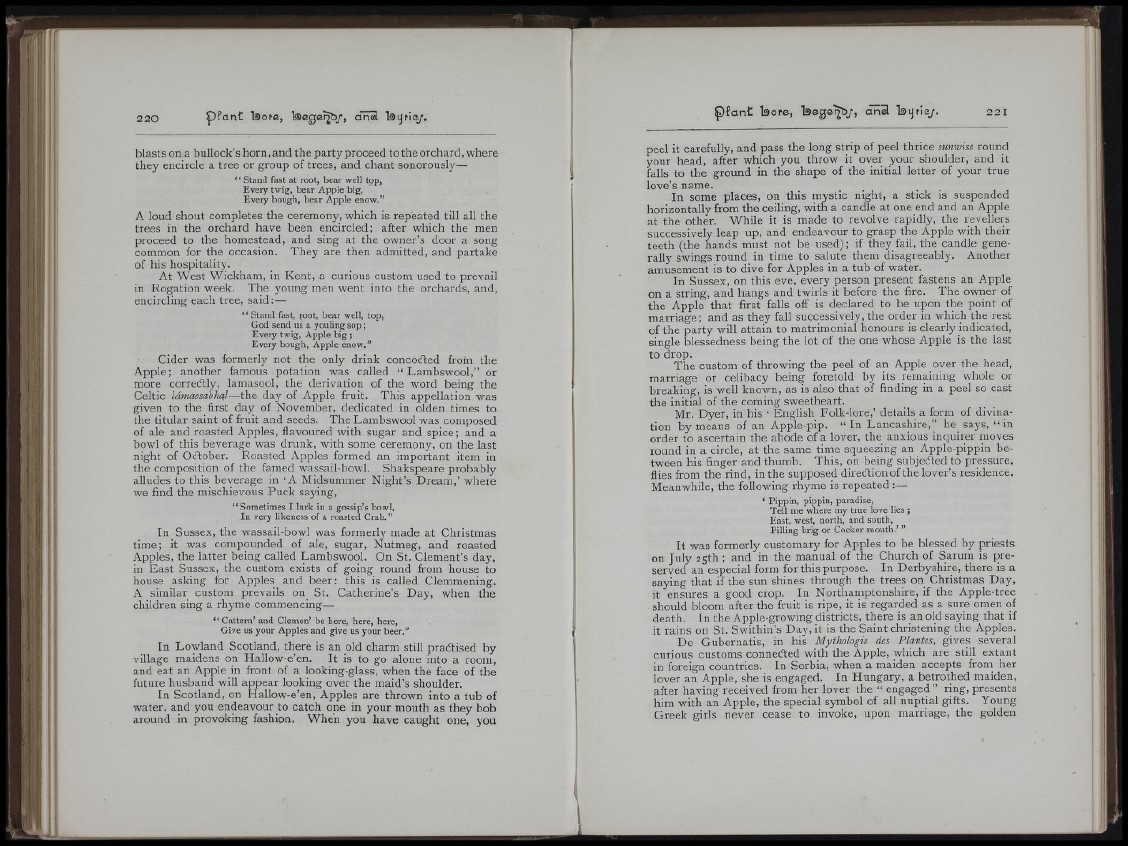
!•!'
!i
II
i i ti.'
blasts on a bullock’s horn, and the party proceed to the orchard, where
they encircle a tree or group of trees, and chant sonorously—
“ Stand fast at root, bear well top,
Every twig, bear Apple big,
Every bough, bear Apple enow.”
A loud shout completes the ceremony, which is repeated till all the
trees in the orchard have been encircled; after which the men
proceed to the homestead, and sing at the owner’s door a song
common for the occasion. They are then admitted, and partake
of his hospitality.
At West Wickham, in Kent, a curious custom used to prevail
in Rogation week. The young men went into the orchards, and,
encircling each tree, said:—
“ Stand fast, toot, bear well, top,
God send us a youling sop ;
Every twig, Apple big;
Every bough, Apple enow,”
Cider was formerly not the only drink concodted from the
Apple; another famous potation was called “ Lambswool,” or
more corredtly, lamasool, the derivation of the word being the
Celtic Idmaesabhal—the day of Apple fruit. This appellation was
given to the first day of November, dedicated in olden times to
the titular saint of fruit and seeds. The Lambswool was composed
of ale and roasted Apples, flavoured with sugar and spice; and a
bowl of this beverage was drunk, with some ceremony, on the last
night of Odtober. Roasted Apples formed an important item in
the composition of the famed wassail-bowl. Shakspeare probably
alludes to this beverage in ‘ A Midsummer Night’s Dream,’ where
we find the mischievous Puck saying,
“ Sometimes I lurk in a gossip’s bowl.
In very likeness of a roasted Crab.”
In Sussex, the wassail-bowl was formerly made at Christmas
time; it was compounded of ale, sugar. Nutmeg, and roasted
Apples, the latter being called Lambswool. On St. Clement’s day,
in East Sussex, the custom exists of going round from house to
house asking for Apples and beer: this is called Clemmening.
A similar custom prevails on St. Catherine’s Day, when the
children sing a rhyme commencing—
“ Cattern’ and Clemen’ be bere, bere, bere,
Give us your Apples and give us your beer.”
In Lowland Scotland, there is an old charm still pracftised by
village maidens on Hallow-e’en. It is to go alone into a room,
and eat an Apple in front of a looking-glass, when the face of the
future husband will appear looking over the maid’s shoulder.
In Scotland, on Hallow-e’en, Apples are thrown into a tub of
water, and you endeavour to catch one in your mouth as they bob
around in provoking fashion. When you have caught one, you
22 1
peel it carefully, and pass the long strip of peel thrice sunwise round
your head, after which you throw it over your shoulder, and it
falls to the ground in the shape of the initial letter of your true
love’s name.
In some places, on this mystic night, a stick is suspended
horizontally from the ceiling, with a candle at one end and an Apple
at the other. While it is made to revolve rapidly, the revellers
successively leap up, and endeavour to grasp the Apple with their
teeth (the hands must not be used); if they fail, the candle generally
swings round in time to salute them disagreeably. Another
amusement is to dive for Apples in a tub of water.
In Sussex, on this eve, every person present fastens an Apple
on a string, and hangs and twirls it before the fire. The owner of
the Apple that first falls off is declared to be upon the point of
marriage; and as they fall successively, the order in which the rest
of the party will attain to matrimonial honours is clearly indicated,
single blessedness being the lot of the one whose Apple is the last
to drop.
The custom of throwing the peel of an Apple over the head,
marriage or celibacy being foretold by its remaining whole or
breaking, is well known, as is also that of finding in a peel so cast
the initial of the coming sweetheart.
Mr. Dyer, in his ‘ English Folk-lore,’ details a form of divination
by means of an Apple-pip. “ In Lancashire,’’ he says, “ in
order to ascertain the abode of a lover, the anxious inquirer moves
round in a circle, at the same time squeezing an Apple-pippin between
his finger and thumb. This, on being subjeffled to pressure,
flies from the rind, in the supposed direcitionof the lover’s residence.
Meanwhile, the following rhyme is repeated:—
* Pippin, pippin, paradise,
Tell me where my true love lies;
East, west, north, and south.
Pilling brig or Cocker mouth.’ ”
It was formerly customary for Apples to be blessed by priests
on Ju ly 25th ; and in the manual of the Church of Sarum is preserved
an especial form for this purpose. In Derbyshire, there is a
saying that if the sun shines through the trees on Christmas Day,
it ensures a good crop. In Northamptonshire, if the Apple-tree
should bloom after the fruit is ripe, it is regarded as a sure omen of
death. In the Apple-growing districts, there is an old saying that if
it rains on St. Swithin’s Day, it is the Saint christening the Apples.
De Gubernatis, in his Mythologie des Plantes, gives several
curious customs connected with the Apple, which are still extant
in foreign countries. In Serbia, when a maiden accepts from her
lover an Apple, she is engaged. In Hungary, a betrothed maiden,
after having received from her lover the “ engaged” ring, presents
him with an Apple, the special symbol of all nuptial gifts. Young
Greek girls never cease to invoke, upon marriage, the golden
I '1